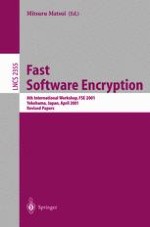2002 | OriginalPaper | Buchkapitel
ZIP Attacks with Reduced Known Plaintext
verfasst von : Michael Stay
Erschienen in: Fast Software Encryption
Verlag: Springer Berlin Heidelberg
Enthalten in: Professional Book Archive
Aktivieren Sie unsere intelligente Suche, um passende Fachinhalte oder Patente zu finden.
Wählen Sie Textabschnitte aus um mit Künstlicher Intelligenz passenden Patente zu finden. powered by
Markieren Sie Textabschnitte, um KI-gestützt weitere passende Inhalte zu finden. powered by
Biham and Kocher demonstrated that the PKZIP stream cipher was weak and presented an attack requiring thirteen bytes of plaintext. The deflate algorithm “zippers” now use to compress the plaintext before encryption makes it difficult to get known plaintext. We consider the problem of reducing the amount of known plaintext by finding other ways to filter key guesses. In most cases we can reduce the amount of known plaintext from the archived file to two or three bytes, depending on the zipper used and the number of files in the archive. For the most popular zippers on the Internet, there is a fast attack that does not require any information about the files in the archive; instead, it gets doubly-encrypted plaintext by exploiting a weakness in the pseudorandom-number generator.
